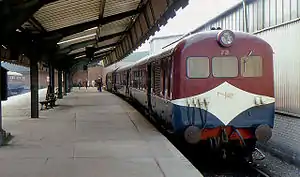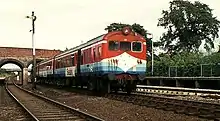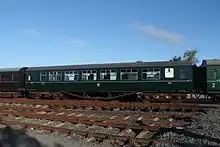UTA 70 Class
UTA 70 class was a diesel multiple unit train built for service on the Ulster Transport Authority's railway network. The MED’s and MPD’s, which made use of readily available power and transmission units, were cheap to operate but noisier and not as comfortable as locomotive-hauled rolling stock, a fact which made them unsuitable for Inter-City journeys. The decision was made to develop a new generation of multiple unit and in July 1966 the first of the new DEMU sets entered service.
| Ulster Transport Authority 70 Class | |
|---|---|
 A Class 70 set stands at Belfast York Road station | |
| In service | 1966–1986 |
| Manufacturer | UTA York Road |
| Number built | 8 power cars, 18 trailers |
| Formation | 3 cars per set |
| Fleet numbers | Power cars: 71–78 |
| Capacity | 248 (6-car set) |
| Operator(s) | Ulster Transport Authority Northern Ireland Railways |
| Specifications | |
| Train length | 379 feet (116 m) (6-car set)[1] |
| Maximum speed | 70 mph (113 km/h) |
| Weight | 245 tons (6-car set) |
| Prime mover(s) | English Electric 4SRKT |
| Power output | 550 hp (410 kW) |
| Track gauge | 1,600 mm (5 ft 3 in) |

History
Investment was needed on the "Inter City" routes and it was a straight choice between new locomotives and coaching stock or a new generation of multiple unit. The decision was made in favour of new multiple units and in 1966 the first of these entered service, designated 70 Class.
Unlike the MEDs and MPDs with their low - powered underfloor engines and mechanical transmissions spread through the train, the new units had a single English Electric engine of 550 horsepower (410 kW), fitted in a compartment between the driving cab and the passenger saloon, and electric transmission. Whilst construction was carried out at the UTA's York Road works in Belfast they imported underframes and body parts. This order comprised parts for the construction of eight power cars and the modification of existing coaches, The 70 Class were first introduced on the former Northern Counties Committee section but were later also worked cross-border trains.
Like the MPDs these units were also suitable for working freight services and regularly appeared on the CIÉ freight services to and from Londonderry.
The 70s were numbered as follows:
- Power Cars 71 to 78.
The original trailer cars were as follows:
- 548 Buffet car (dual cables for MPD+70)
- 550 Buffet car (converted from MPD car)
- 701-703 Brake cars
- 711-712 Driving Brake cars
- 721-725 Standard trailers
In 1968–1969 more trailers were added.
- 554 Buffet car
- 713-714 Driving Brake cars
- 726-727 Standard trailers
The power cars' interiors were rebuilt between 1976 and 1979. During the same period 711 to 714 and 726 were rebuilt from side corridor to open layout.
Trailer 728 (brake Standard) was rebuilt in 1976 from MPD driving trailer 534
In 1977 701 and 703 were rebuilt as Driving Brake Standard open.
It was decided in 1983 that the 70 Class railcars would be replaced, No. 78 had already been withdrawn in 1978 after just 10 years of service after being bombed by the IRA. No. 76 was withdrawn in 1984 and the remaining units followed in 1985–1986. The last set in service was a five-car set operated by power cars no. 75 and 77. Both were withdrawn on Tuesday 1 April 1986. For the new units, and after heavy refurbishment, engines, generators and traction motors were recovered as the 70s were withdrawn for re-use in the new 450 class. After withdrawal, it was discovered that the power cars contained blue asbestos, so they were sent to Crosshill quarry, Crumlin, along with other NIR stock and even some CIÉ stock for disposal. They were put into a flooded part of the quarry, since water dampens asbestos, meaning that no loose fibers could escape from their structures. Most of the under frames were kept for use as flatbeds.
Preservation
Buffet Car 550 entered preservation in 1978 with the Railway Preservation Society of Ireland,[2] whereupon it regained its original UTA number, 87, and was painted in LMS NCC livery. Intermediate trailer no. 728 lay at York Road until 1991, and is now at the Downpatrick and County Down Railway. Driving trailer no. 713 was also preserved at Downpatrick but was destroyed by a malicious fire in 2002. Its underframe remains in use as a flat wagon.
Status

| Key: | Scrapped | Preserved |
|---|
| Number | Power Car Name | Status | Notes |
|---|---|---|---|
| Power cars | |||
| 71 | River Bush | Scrapped | Engines, generators and traction motors refurbished for use in 450 Class |
| 72 | River Foyle | ||
| 73 | River Roe | ||
| 74 | River Lagan | ||
| 75 | River Main | ||
| 76 | River Inver | ||
| 77 | River Braid | ||
| 78 | River Bann | ||
| Buffet cars | |||
| 548 | Scrapped | Ex MPD buffet | |
| 550 | Preserved by RPSI |
Ex MPD buffet | |
| 554 | Scrapped | Ex AEC buffet | |
| Trailer cars | |||
| 701 | Scrapped | Brake First Rebuilt as DBSO 1977 | |
| 702 | Scrapped | Brake Composite | |
| 703 | Scrapped | Brake Standard Rebuilt as DBSO 1977 | |
| 711 | Scrapped | Driving Brake Composite | |
| 712 | Scrapped | Driving Brake Composite | |
| 713 | Scrapped | Driving Brake Standard Preserved by DCDR Body destroyed by arson 2002 Underframe in use as a flat wagon | |
| 714 | Scrapped | Driving Brake Standard | |
| 721 | Scrapped | Trailer Standard | |
| 722 | Scrapped | ||
| 723 | Scrapped | ||
| 724 | Scrapped | ||
| 725 | Scrapped | ||
| 726 | Scrapped | ||
| 727 | Scrapped | ||
| 728 | Preserved by DCDR |
Trailer Standard Ex MPD driving trailer | |
References
- Modern Railways September 1966 p. 481
- Edgar, Alan (Summer 1978). "Carriage & Wagon Report" (PDF). Five Foot Three. RPSI. 22. Retrieved 22 November 2014.
| Wikimedia Commons has media related to UTA 70 Class. |